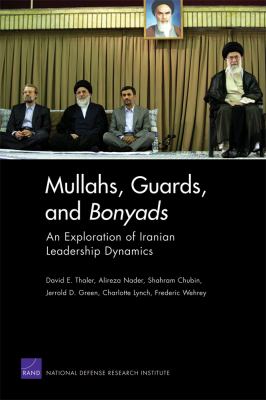
e-Book
|
Mullahs, guards, and bonyads : an exploration of Iranian leadership dynamics
Copies
0 Total copies, 0 Copies are in,
0 Copies are out.
Title
Mullahs, guards, and bonyads : an exploration of Iranian leadership dynamics
Call No
DS318.825
Digital Link
Authors
Subjects
Language
English
Published
Santa Monica, CA : RAND, ©2010.
Publication Desc
1 online resource (xxiii, 144 p.) : ill. (some col.).
ISBN
9780833049308
(electronic bk.)
Series









